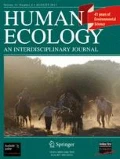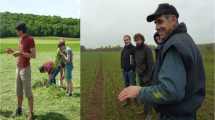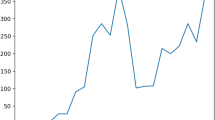Abstract
Social learning approaches have become a prominent focus in studies related to sustainable agriculture. In order to better understand the potential of social learning for more sustainable development, the present study assessed the processes, effects and facilitating elements of interaction related to social learning in the context of Swiss soil protection and the innovative ‘From Farmer - To Farmer’ project. The study reveals that social learning contributes to fundamental transformations of patterns of interactions. However, the study also demonstrates that a learning-oriented understanding of sustainable development implies including analysis of the institutional environments in which the organizations of the individual representatives of face-to-face-based social learning processes are operating. This has shown to be a decisive element when face-to-face-based learning processes of the organisations’ representatives are translated into organisational learning. Moreover, the study revealed that this was achieved not directly through formalisation of new lines of institutionalised cooperation but by establishing links in a ‘boundary space’ trying out new forms of collaboration, aiming at social learning and co-production of knowledge. It is argued that further research on social learning processes should give greater emphasis to this intermediary level of ‘boundary spaces’.

Similar content being viewed by others
Notes
While ‘farmer to farmer’-approaches are well-known in the South, especially in Latin America (see Holt-Giménez 2006), in Europe this approach is relatively unknown. Consequently,—as will be showed later—the project leader developed the ‘from farmer–to farmer’ project mainly independently of the Latin American experiences.
References
Altieri, M. A. (2004). Linking Ecologists and Traditional Farmers in the Search for Sustainable Agriculture. Frontiers in Ecology and the Environment 2(1): 35–42. doi:10.1890/1540-9295(2004)002[0035:LEATFI]2.0.CO;2.
Auzet, A. -V. (2003). From soil erosion knowledge to soil protection and runoff prevention - COST 623. In Boix-Fayos, C., Dorren, L., and Imeson, A. C. (eds.), Briefing papers of the first SCAPE workshop. Scape Office, Amsterdam, pp. 27–29.
Blum, A. (1994). Das landwirtschaftliche Wissenssystem der Schweiz. AGRARForschung 1(11–12): 507–510.
Boardmann, J., and Poesen, J. (2006). Soil Erosion in Europe. Wiley, Chichester.
Buck, L. E. (2003). Strengthening natural resource institutions in Africa - Applying social learning to reconciling poverty reduction and environmental management., Proceedings of the International Workshop on Reconciling Rural Poverty Reduction and Resource Conservation: Identifying Relationships. Cornell University Press, Remedies, pp. 1–27.
Burawoy, M. (1998). The Extended Case Method. Sociological Theory 16(1): 4–33. doi:10.1111/0735-2751.00040.
Carr, A., and Wilkinson, R. (2005). Beyond Participation: Boundary Organizations as a New Space for Farmers and Scientists to Interact. Society and Natural Resources 18(3): 255–265. doi:10.1080/08941920590908123.
Coughenour, M. C. (2003). Innovating Conservation Agriculture: The Case of No-Till Cropping. Rural Sociology 68(2): 278–304. http://search.ebscohost.com/login.aspx?direct=true&db=sih&AN=9750179&site=ehost-live.
Davidson-Hunt, I. J. (2006). Adaptive Learning Networks: Developing Resource Management Knowledge through Social Learning Forums. Human Ecology 34(4): 593–614.
Eshuis, J., and Stuiver, M. (2005). Learning in Context Through Conflict and Alignment: Farmers and Scientists in Search of Sustainable Agriculture. Agriculture And Human Values 22(2): 137–148. doi:10.1007/s10460-004-8274-0.
Fry, P. (2001). Bodenfruchtbarkeit - Bauernsicht und Forscherblick. Margraf Verlag, Weikersheim.
Fry, P. (2004). Von Bauern - für Bauern: Ein neuer Ansatz fördert den mechanischen Bodenschutz in der Landwirtschaft. BGS Bulletin 27: 91–96.
Funtowicz, S. O., and Ravetz, J. R. (1993). Science For The Post-Normal Age. Futures 25(7): 739–755. doi:10.1016/0016-3287(93)90022-L.
Funtowicz, S. O., and Ravetz, J. R. (1994). The Worth Of A Songbird - Ecological Economics As A Post-Normal Science. Ecological Economics 10(3): 197–207. doi:10.1016/0921-8009(94)90108-2.
Gibbons, M., Limoges, C., and Nowotny, H. (1995). The New Production of Knowledge: The Dynamics of Science and Research in Contemporary Societies. Sage, London.
Helming, K., Rubio, J. L., and Boardman, J. (2006). Soil Erosion Across Europe: Research Approaches and Perspectives. Catena 68(2–3): 71–72.
Holt-Giménez, E. (2006). Campesino a Campesino: Voices from Latin America's Farmer to Farmer Movement for Sustainable Agriculture. Oakland: Oakland.
Hurni, H., and Wiesmann, U. (2004). Towards transdisciplinarity in sustainability-oriented research for development. In Hurni, H., Wiesmann, U., and Schertenleib, R. (eds.), Research for Mitigating Syndromes of Global Change Geogaphica Bernensia, Bern, pp. 31–41.
Jiggins, J., van Slobbe, E., and Röling, N. (2007). The organisation of social learning in response to perceptions of crisis in the water sector of The Netherlands. Environmental Science & Policy 10(6): 526. doi:10.1016/j.envsci.2006.12.006.
Kates, R. W., Clark, W. C., Corell, R., Hall, J. M., Jaeger, C. C., Lowe, I., McCarthy, J. J., Schellnhuber, H. J., Bolin, B., Dickson, N. M., Faucheux, S., Gallopin, G. C., Grubler, A., Huntley, B., Jager, J., Jodha, N. S., Kasperson, R. E., Mabogunje, A., Matson, P., Mooney, H., Moore Iii, B., O'Riordan, T., and Svedlin, U. (2001). Environment and Development: Sustainability Science. Science 292(5517): 641–642. doi:10.1126/science.1059386.
Klein, J. T. (2001). Transdisciplinarity: Joint Problem Solving among Science, Technology, and Society. Birkhäuser, Basel.
Ledermann, T., and Schneider, F. (2008). Verbreitung der Direktsaat in der Schweiz. AGRARForschung 15(8): 372–377. http://www.agrarforschung.ch/.
Ledermann, T., Herweg, K., Liniger, H., Schneider, F., Hurni, H., and Prasuhn, V. (2008). Erosion damage mapping. Assessing current soil erosion damage in Switzerland. In Dazzi, C., and Costantini, E. (eds.), The soils of tomorrow. Advances in Geoecology 39, 263–284.
Mosimann, T., Crole-Rees, A., Maillard, A., Neyroud, J. -A., Thöni, M., Musy, A., and Rohr, W., (1990). Bodenerosion im Schweizerischen Mittelland. Ausmass und Gegenmassnahmen. Liebefeld-Bern.
Nonaka, I., Konno, N., and Toyama, R. (2001). Emergence of “Ba”. A conceptual framework for the continuous and self-transcending process of knowledge creation. In Nonaka, I. (ed.), Knowledge emergence. Social, technical, and evolutionary dimensions of knowledge creation. Oxford University Press, New York, pp. 13–29.
Nowotny, H., Gibbons, M., and Scott, P. (2001). Re-thinking Science: Knowledge and the Public in an Age of Uncertainity. Polity, Cambridge.
Pohl, C. (2008). From Science to Policy Through Transdisciplinary Research. Environmental Science & Policy 11(1): 46. doi:10.1016/j.envsci.2007.06.001.
Prasuhn, V., and Grünig, K. (2001). Evaluation der Ökomassnahmen - Phosphorbelastung der Oberflächengewässer durch Bodenerosion. FAL-Schriftenreihe Nr. 37, Zürich-Reckenholz.
Prasuhn, V., and Weisskopf, P. (2004a). Current approaches and methods to measure, monitor and model agricultural soil erosion in Switzerland. paper presented at Agricultural Impacts on Soil Erosion and Soil Biodiversity: Developing Indicators for Policy Analysis., Rome, Italy.
Prasuhn, V., and Weisskopf, P. (eds.), (2004b). Current approaches and methods to measure, monitor and model agricultural soil erosion in Switzerland.
Reichert, D., Fry, P., Heid, C., and Steinemann, U. (2000). Wissenschaft als Erfahrungswissen. Deutscher Universitäts-Verlag, Wiesbaden.
Rist, S., Chiddambaranathan, M., Escobar, C., and Wiesmann, U. (2006). “It Was Hard to Come to Mutual Understanding” The Multidimensionality of Sociallearning Processes Concerned with Sustainable Natural Resource Use in India, Africa and Latin America. Journal of Systemic Practice and Action Research 19: 219–237. doi:10.1007/s11213-006-9014-8.
Rist, S., Chiddambaranathan, M., Escobar, C., Wiesmann, U., and Zimmermann, A. (2007). Moving from Sustainable Management to Sustainable Governance of Natural Resources: The Role of Social Learning Processes in Rural India, Bolivia and Mali. Journal of Rural Studies 23: 23–37. doi:10.1016/j.jrurstud.2006.02.006.
Röling, N. G. (2002). Beyond the aggregation of individual preferences. Moving from multiple to distributed cognition in resource dilemmas. In Leeuwis, C., and Pyburn, R. (eds.), Wheelbarrows Full of Frogs: Social Learning in Rural Resource Management. Koninklijke Van Gorcum BV, Assen, pp. 25–47.
Röling, N. G., and Wagemakers, M. A. E. (2000). A new practice: facilitating sustainable agriculture. In Röling, N. G., and Wagemakers, M. A. E. (eds.), Facilitating Sustainable Agriculture. Cambridge University Press, Cambridge, New York, pp. 3–22.
Roux, M. (1997). Lernprozesse für eine nachhaltige Landwirtschaft in Kulturlandschaften. LBL, Lindau.
Roux, D. J., Rogers, K. H., Biggs, H. C., Ashton, P. J., and Sergeant, A. (2006). Bridging the science-management divide: moving from unidirectional knowledge transfer to knowledge interfacing and sharing. Ecology and Society 11(1): Article 4 [online] URL: http://www.ecologyandsociety.org/vol11/iss11/art14/. [online] URL:
Schneider, F., Ledermann, T., Fry, P., and Rist, S. (2009). Soil conservation in Swiss agriculture—Approaching abstract and symbolic meanings in farmers’ life-worlds. Land Use Policy. Corrected proof.
Schusler, T. M., Decker, D. J., and Pfeffer, M. J. (2003). Social Learning for Collaborative Natural Resource Management. Society and Natural Resources 16(4): 309–326. doi:10.1080/08941920390178874
Steyaert, P., Barzman, M., Billaud, J. P., Brives, H., Hubert, B., Ollivier, G., and Roche, B. (2007). The Role of Knowledge and Research in Facilitating Social Learning among Stakeholders in Natural Resources Management in the French Atlantic Coastal Wetlands. Environmental Science & Policy 10(6): 537–550. doi:10.1016/j.envsci.2007.01.012.
Tàbara, J. D., and Pahl-Wostl, C. (2007). Sustainability Learning in Natural Resource Use and Management. Ecology and Society 12(2): 3. [online] URL: http://www.ecologyandsociety.org/vol12/iss12/art13/. [online] URL:.
Van-Champ, L., Bujarrabal, B., Gentile, A. R., Jones, R. J. A., Montanarella, L., Olazabal, C., and Selvaradjou, S. (2004). Volume - II. Erosion. Reports of the Technical Working Groups. European Commission European Environment Agency.
Vinck, D. (1999). Les objets intermédiaires dans les réseaux de coopération scientifique. Contribution à la prise en compte des objets dans les dynamiques sociales. Revue française de sociologie 2(40): 385–414. http://www.persee.fr/web/revues/home/prescript/article/rfsoc_0035–2969_1999_num_40_2_5173.
Warner, K. D. (2007). Agroecology in Action: Extending Alternative Agriculture Through Social Networks. MIT Press, Cambridge, Massachusets.
Warner, K. D. (2008). Agroecology as Participatory Science. Emerging Alternatives to Technology Transfer Extension Practice. Science, Technology & Human Values 33(6): 754–777. doi:10.1177/0162243907309851.
Weisshaidinger, R., and Leser, H. (2006). Switzerland. In Boardmann, J., and Poesen, J. (eds.), Soil erosion in Europe. John Wiley, Chichester, pp. 231–244.
Woodhill, J. (2002). Sustainability, social learning and the democratic imperative. Lessons from the Australian landcare movement. In Leeuwis, C., and Pyburn, R. (eds.), Wheelbarrows Full of Frogs: Social Learning in Rural Resource Management Koninklijke Van Gorcum BV, Assen, pp. 317–331.
Woodhill, J., and Röling, N. G. (2000). The second wing of the eagle: the human dimension in learning our way to more sustainable futures. In Röling, N. G., and Wagemakers, M. A. E. (eds.), Facilitating sustainable Agriculture. Participatory learning and adaptive management in times of environmental uncertainty. Cambridge University Press, Cambridge, pp. 46–72.
Acknowledgement
The project is affiliated to the COST Action 634 (On- and Off-site Environmental Impacts of Runoff and Erosion). The authors wish to thank the Swiss State Secretariat for Education and Research SER for financing the study, and the Federal Office for the Environment FOEN, the Federal Office for Agriculture FOAG and the Swiss National Centre of Competence in Research North-South (NCCR North-South) for their financial contributions.
We like to thank Tobias Buser and Karina Liechti for many fruitful discussions and helpful comments to earlier versions of this article.
Author information
Authors and Affiliations
Corresponding author
Rights and permissions
About this article
Cite this article
Schneider, F., Fry, P., Ledermann, T. et al. Social Learning Processes in Swiss Soil Protection—The ‘From Farmer - To Farmer’ Project. Hum Ecol 37, 475–489 (2009). https://doi.org/10.1007/s10745-009-9262-1
Published:
Issue Date:
DOI: https://doi.org/10.1007/s10745-009-9262-1




